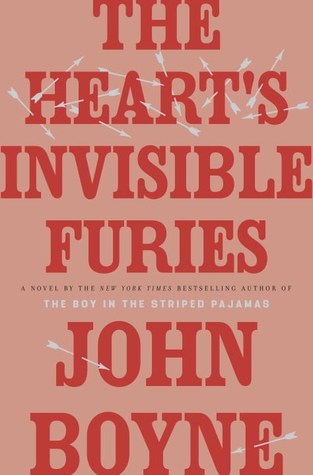 Anyone who's thinking of reading this book might want to read up on the Bury Your Gays page on TV Tropes, but for those who don't want to or don't have the time, let me sum it up for you: it's quite the cliche in works of fiction that gay characters don't deserve happy endings, and that's basically this book summed up.
Anyone who's thinking of reading this book might want to read up on the Bury Your Gays page on TV Tropes, but for those who don't want to or don't have the time, let me sum it up for you: it's quite the cliche in works of fiction that gay characters don't deserve happy endings, and that's basically this book summed up.Following Cyril Avery from before his birth through to just a few months before his death in seven-year increments, the story is basically that of how a gay man born in 1945 Ireland just after the end of World War II is utterly undeserving of happiness. Cyril is, of course, not actually undeserving of happiness, but Boyne seems to think he is, and rains down a lifetime of woes upon him. While Ireland is a country that has traditionally been extremely conservative because of strong Catholic influences, not all of the book takes place there, and yet even in the parts that don't, Cyril is pursued by a cloud of ill fortune. Just when you think things are starting to look up for Cyril, something else slams down, and usually a succession of somethings. This is supposed to be spun as a story of the endurance of the human spirit, but really it comes off as another story of, "Oh, isn't it tragic to be gay and to never be able to find true love, or hold it if you do?"
Here's the thing: if this book had just been the first part, I totally would have been onboard with this, tropey as it is, because of the time and place. 1940s to 1960s Ireland was not a great place to be a gay person, particularly a gay man. It's not that hard to see that. And if the story had been about Cyril persevering through these conditions to find fulfillment in some way--it didn't necessarily have to be romantically--it would have been good. But once the story moved on to later times and to places that were more accepting, such as Amsterdam and New York (albeit during the period when AIDs was terrifying the populace) the amount of punishment Boyne heaped on Cyril for being gay and then for accepting who he was seemed utterly excessive.
That said, there were pieces of this that I liked. We can infer early on in the story that Cyril eventually finds out who his birth mother is, even though he's raised by adoptive parents and constantly told that he's "not a real Avery." But seeing Cyril and his mother frequently and unwittingly cross paths was charming and a way to keep the narrative going, sometimes drawing in other past characters to reinforce the story's "web." I liked the scope of the story in its journey through times and place, and the wide variety of characters that Boyne brought in. But the overall tone of the story seriously struck a wrong note with me, and that's something that I can't really let slide, and honestly I'm disappointed that Book of the Month put this out as a selection.
2 stars out of 5.
No comments:
Post a Comment